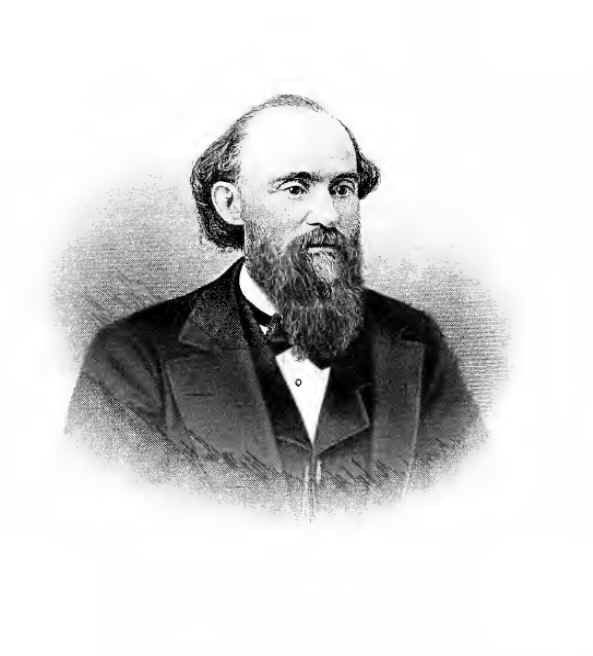
MIDDLETOWN CONNECTICUT Wilcox-Crittenden |
Tool
Makers of |
Tools Made: Caulking Irons, Yacht Scrapers, Compasses, Dividers, Marlin Spikes, Clamps, Setting Dies, Cutting Chisels, Punches Hawsing Beetles, Caulking Mallets, Sail Makers Tools, Rules, Box and Hay Hooks, Mauls, Ash Shovels, Adze, Tape Lines, Fids, Plane Irons.
Note. The tools listed above are from various W/C catalogs. Some of the tools were most likely made by other companies. However, with access to production records I have no way of knowing who made what.
Working Dates: 1847-present.
William Walter Wilcox 1825-1903
William Walter Wilcox JR. 1862-1940
William Walter Wilcox III 1901-40
This company made nautical hardware. Map G. The company is still in operation but not in Middletown, CT. They made a few tools among them were caulking irons and yacht scrapers. Some of the buildings used by this company are or are in the process of being converted into condominiums. The buildings are located in the South Farms district on South Main Street. The 1878 city directory has the company at 4 South Main Street. Historic information and pictures here.
William Walter Wilcox and Ira K. Penfield lived on South Main Street a few blocks away from the factory. Ira lived at 51 South Main in a house built in 1854. Ref. 30.
William Walter Wilcox. (1825-1903)

From Ref. 14 Page 165-6.
William Walter Wilcox
"Most of the representative men of this country are born and educated in the school of adversity,
and their success in life is achieved by honest, hard work and persevering effort. To this class belongs
William W. Wilcox. Two brothers, viz., Thomas and John, one of whom was his American ancestor,
came from Hartford to Middletown in 1650, and settled in the second and third ecclesiastical parishes,
viz., Middletown Upper Houses and Westfield Parish. William W. was the only child of William W. and
Mary Wilcox. The death of his father occurred before he was born, and his mother died before he was
two years old. He was placed in the care of his grandmother until he was six years of age, when he was
taken into the family of his aunt, the wife of Ira K. Penfield, of Portland, Connecticut, where he remained
until he was nineteen years of age, attending school a portion of the time, the remainder working in his uncle's shop.
Being in delicate health he went to New York and engaged himself to a book concern, a.s traveling agent.
He visited different parts of the South and finally recovered his health. In 1848, he returned to Middletown and
engaged himself for seventy-five cents a day to Eldridge H. Penfield, who had just commenced the manufacture of
grommets for sails. Here he learned the mechanical operations connected with the manufacture of grommets.
Penfield having insufficient capital to continue the business, through the influence of Mr. Wilcox, his uncle, Ira K.
Penfield, sold out his business in Portland, and buying a half interest, the new firm of E. H. & I. K. Penfield
continued the manufacture of grommets. Consigning goods to agents brought small returns, and at the
end of two years E. H. Penfield became discouraged and sold his interest to Ira K. Penfield. By strict
economy young Wilcox had saved $250 while in the employ of E. H. & I. K. Penfield. This was his capital
in the new firm of Penfield & Wilcox, which, with his services, gave him one-quarter interest in a business
which had thus far not proved a success. An impetus was given the business at once by closing the agencies,
and dealing directly with consumers. With trunks full of grommets, and tools to insert them, Mr. Wilcox
started out with the determination to visit all the sail lofts along the coast to Halifax, Nova Scotia, showing
the use and utility of the new metallic grommet, presenting a gross or two to those who could not be induced
to buy. In this way the business became a success, notwithstanding the opposition of journeymen sail makers,
who opposed their use for several years, as lessening the amount of labor in making sails. A new round edge
sail thimble was soon after invented by Mr. Wilcox. Cast of malleable iron and galvanized, they soon came
into general use, and entirely superseded the wrought sharp edge thimble, which cut and wore the ship's ropes.
He was the first in this country to introduce galvanized iron work for ship's use. At the end of ten years,
having accumulated a capital of $4,500, he dissolved partnership with his uncle and started in business for
himself, having hired a building on the Pameacha River, at the present location, for $75 a year.
About this time he invented an improved grommet, made in three parts, which he patented. He also
added to his stock a variety of sailmakers' and ship chandlery goods. The increase of business that
followed necessitated an increase of capital, and he subsequently took in Joseph Hall jr., of Portland,
as partner. At the end of the next ten years he purchased Mr. Hall's interest, and a new co-partnership
was formed, consisting of W. W. Wilcox, E. Bound Chaffee, A. R. Crittenden, and Homer Churchill;
who now comprise the firm of Wilcox, Crittenden & Co. The house is now one of the largest in this line
of business in the United States. Mr. Wilcox has recently invented a new grommet for which he received
a patent, August 26th 1884. He has always confined himself strictly to his business, at the same time
manifesting a deep interest in the affairs of his native town, and, in 1877, he was solicited by his friends
to accept the republican nomination for the Legislature, and was elected by a considerable majority.
As an evidence of his personal popularity, it may be stated that for thirteen years previous to this time
Middletown was represented in the Legislature by democrats. In 1879, Mr. Wilcox received the nomination
and was again elected. He has held other public positions of trust and responsibility. In 1880, he was
nominated for State Senator, but was defeated by a small majority, his opponent being Dr. J. W. Alsop.
He has also served as a member of the Common Council.
His investments have been confined strictly to his legitimate business. In 1883, he was solicited to become
a director in the Middletown National Bank, and was elected to the position. There are few men who
have lived in Middletown during the last century who have borne a more enviable reputation or have
been held in higher esteem by their fellow citizens. His life presents a worthy example to the
rising generation, affording a practical demonstration of the self made man. On the 17th of November 1853,
he married Elizabeth, daughter of George and A. E. Crittenden, of Portland, by whom he had three children,
two of whom, William Walter, born April 11th 1862, and Mary C, born August 8th 1866, are now living."
E. Bound Chaffee Albert R. Crittenden
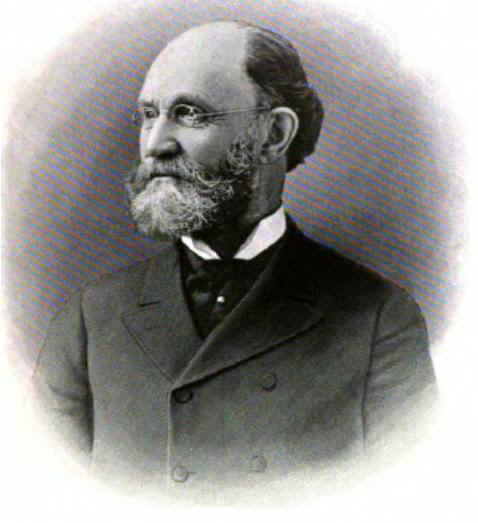
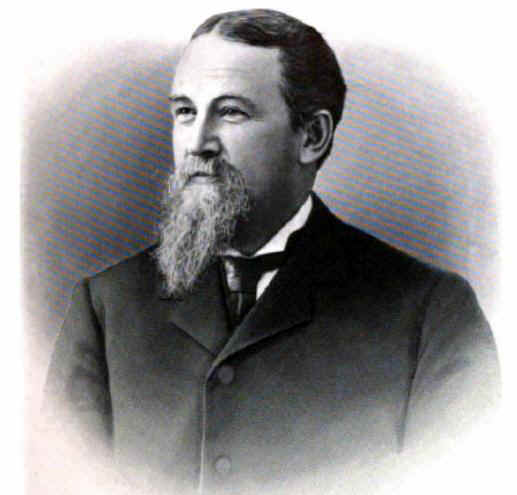
1882 Trade Card. Photos courtesy of Glenn Olney.
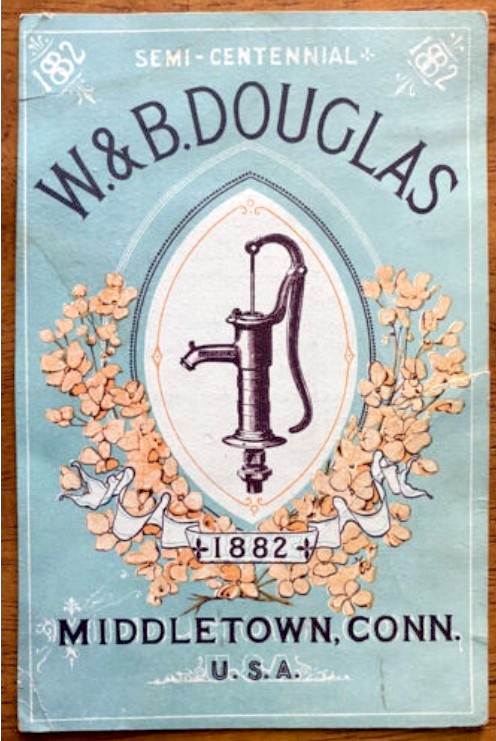
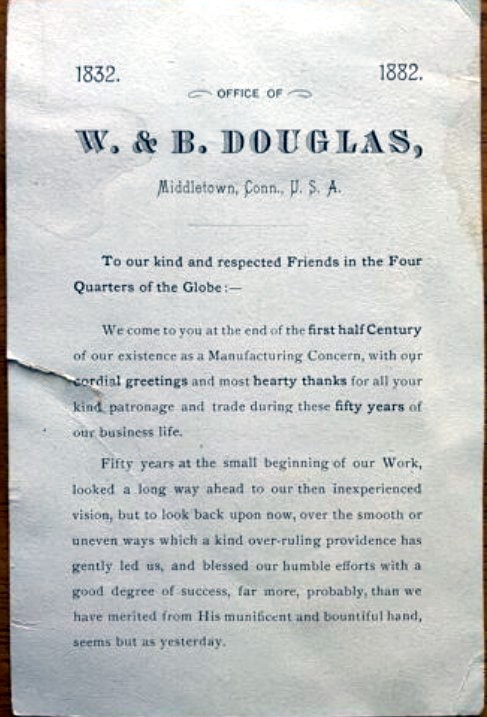
Records are at The Mystic Sea Port here
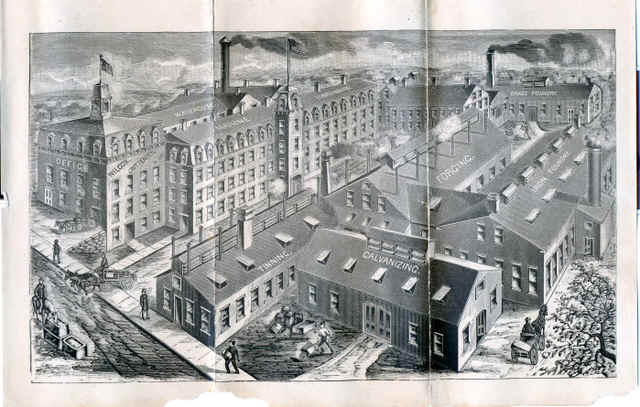
Ref. 50. Page 2.
A brief history.
The company was started by Eldridge H. Penfield and his uncle Ira K. Penfield in 1847 to manufacture metal sail grommets. William W. Wilcox was an employee. This lasted two years. Eldridge H. Penfield left and William W. Wilcox invested and the company became Penfield & Wilcox. I.K. Penfield retired in 1859 and Joseph Hall, JR. joined. The company was called Wilcox & Hall. Hall retired in 1867 and in 1869 three partners were added, Albert R. Crittenden, E. Bound Chaffee, and Homer Churchill. The company was called Wilcox-Crittenden & CO. It became a division of North & Judd in 1955. By 1971 it was a Gulf & Western company and by 1975 a division of Gulf & Western Manufacturing Company. Thetford Corporation purchased the company in 2003. This company is in Middletown, RI.
Here is a link for the Wikipedia information on this firm.
http://en.wikipedia.org/wiki/Wilcox,_Crittenden_Mill
Here is a link for Wilcox-Crittenden Mill National Register of Historic Places.
The story of Wilcox-Crittenden is interesting. It started with a small metal grommet and grew to the largest manufacturer on nautical hardware in America.
E. H. & I. K. Penfield. 1848-49 Eldridge Penfield and uncle Ira Penfield
Penfield & Wilcox. 1850-59 Ira Penfield and William W. Wilcox
Wilcox & Hall. 1859-69 Joseph Hall, Jr.
Wilcox, Crittenden & Company. 1869- 1961 Albert R. Crittenden, E. Bound Chaffee, and Homer Churchill.
A Division of North & Judd 1961-71
A Gulf + Western Precision Engineering Company
1971-75
A division of Gulf + Western Manufacturing Company.
1975-2003
Thetford Corporation 2003-Present.
From Mystic Seaport, Ct.
http://library.mysticseaport.org/manuscripts/coll/coll231.cfm
History of Wilcox, Crittenden & Co.
In 1847, Middletown was New England's largest inland port, and it was in that year the company that would become Wilcox, Crittenden & Co., Inc. was established. According to the centennial history of the company, it was in Ben Butler's sail loft in Middletown that Eldridge Penfield first conceived of developing a metal grommet (later to be called the sail eyelet grommet) to replace the rope grommets that were currently being used by sailmakers.
In partnership with his uncle, Ira Penfield, Eldridge Penfield formed the firm of E. H. & I. K. Penfield. The business was opened in a small building at the rear of the property located at Main and William Street in Middletown, and was the first company in America to produce metal grommets. The first grommets were stamped out using hand presses which were operated by the partners and by William Walter Wilcox, whom they had hired.
For the next two years, Penfield tried to market the new grommets by utilizing traveling salesmen who brought and sold on consignment and kept most of the profits. After this unsuccessful period, Eldridge Penfield sold out his interest to Ira Penfield, and Wilcox invested his savings and became a partner in the new firm called Penfield & Wilcox.
By using more direct marketing techniques, Wilcox was able to overcome the opposition that developed on the part of journeymen sailmakers who feared that the use of the new grommet would reduce the need for their services. The company prospered and added other items to their inventory based on the needs of sailmakers. In 1857, Wilcox invented and patented a new and improved grommet made in three parts which was even more successful than the original device. He also invented a round-edged sail thimble which replaced the iron, sharp-edged thimble previously in use.
The partnership of Penfield & Wilcox was dissolved circa 1859, when Ira Penfield retired. Wilcox moved the business and took into partnership Joseph Hall, Jr. of Portland, CT and formed the firm of Wilcox & Hall, which continued until 1867 when Hall retired and sold his interest to Wilcox.
In 1869, Wilcox formed a partnership with three of the younger men of his organization, Albert R. Crittenden, E. Bound Chaffee, and Homer Churchill. Crittenden purchased a tenth interest in the business for $5,000, and name of the firm was changed to Wilcox, Crittenden & Company.
In the maritime world, steam was gradually replacing sail, and the company's 1870 catalog offered such varying products as shackles, thimbles, ring bolts, "Ereful whistles," engine-room signals, boat nails "of good Swede's steel heavily galvanized," and cotton hooks "New Orleans pattern." A new outlet for sailmakers was in manufacturing awnings and the company began stocking awning hardware as well. In 1883, Wilcox developed an improved brass grommet (which became known as the spur grommet), secured its approval as standard equipment by the British Admiralty, and eventually it was adopted by all the leading navies of the world. By the late 1880's, Wilcox, Crittenden & Company had become the largest manufacturers of marine hardware with the most diversified line in the United States.
The company survived a fire in 1907 which destroyed a large portion of the plant. They maintained during the World Wars and the Depression and by 1961, Wilcox, Crittenden & Co., Inc. was a division of North & Judd Manufacturing Co. By 1971 it was a Gulf + Western Precision Engineering Company, and by 1975, a division of Gulf + Western Manufacturing Company.
Caulking iron with logo.

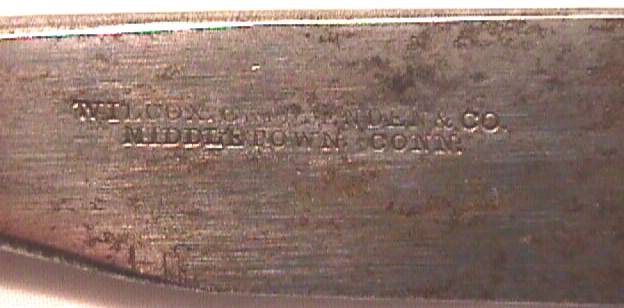
Logo on the iron "WILCOX-CRITTENDEN & CO.
MIDDLETOWN, CONN."
Below is one of their magnetic compasses. Their logo, WC, was used to designate north.
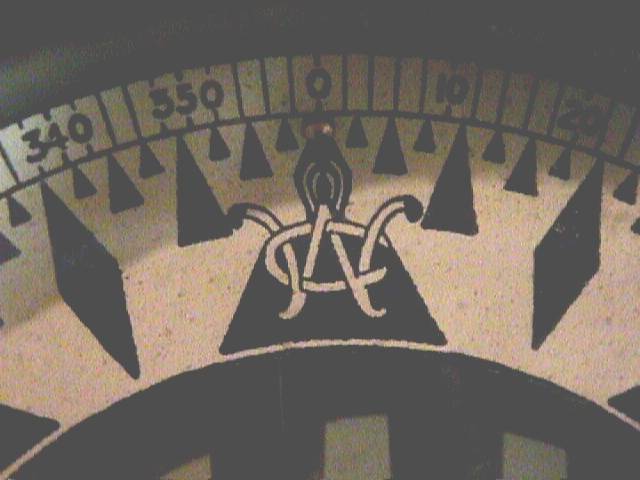
1883 Catalog
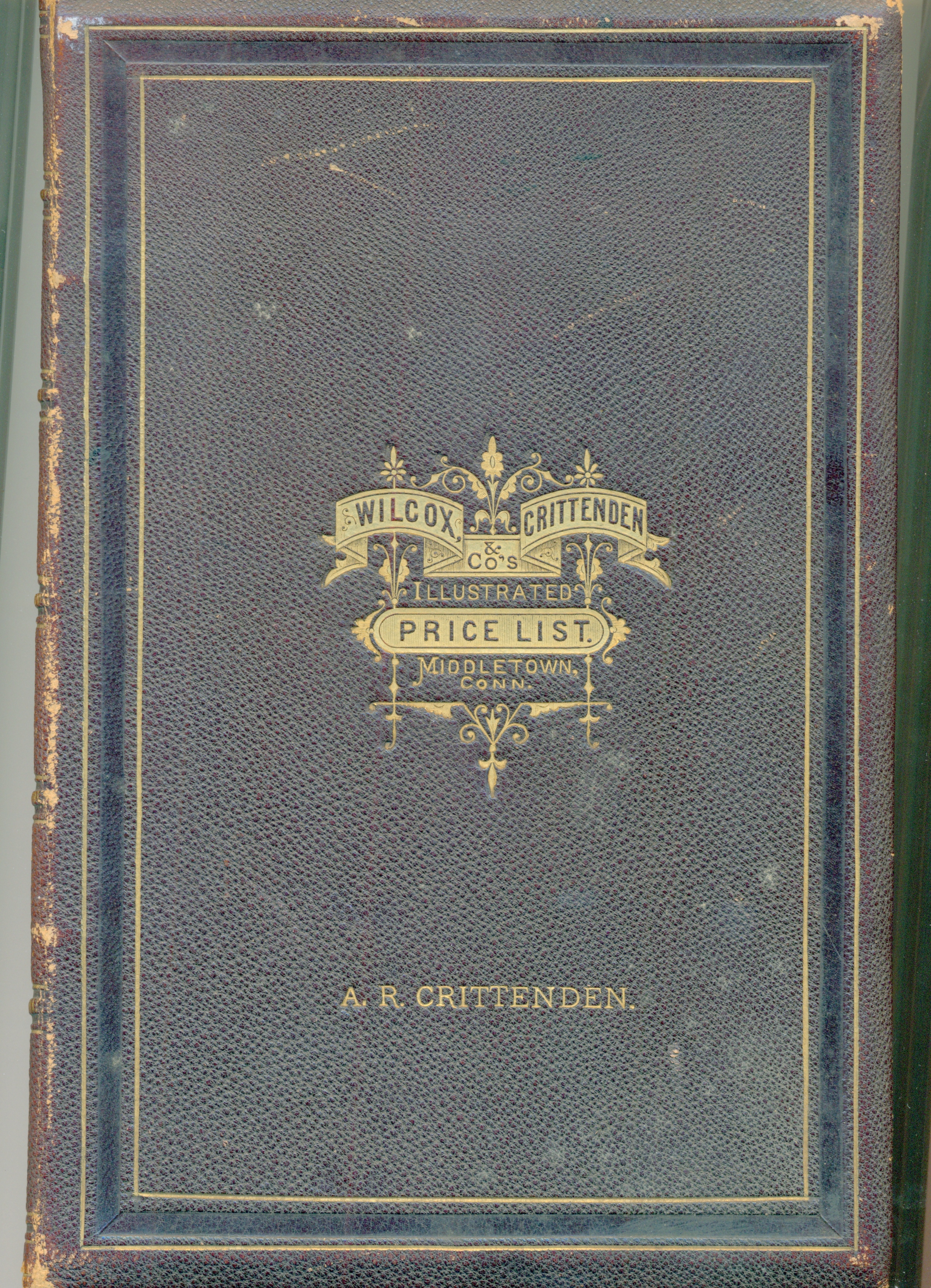
A 1930 catalog on the left and 1936 catalog on the right.
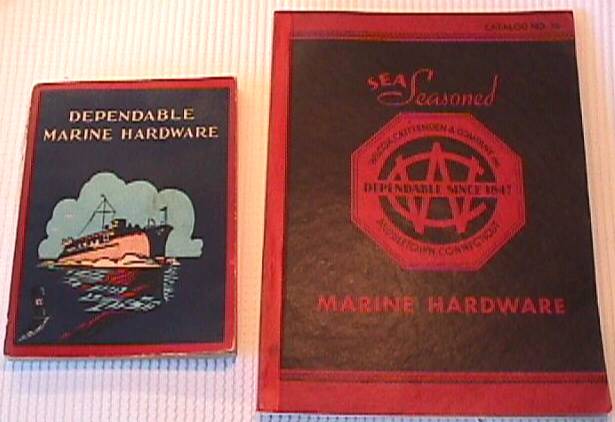
Patents issued or assigned to this company or one of its owners. See Ref. 24 for more
Middletown patents.
Name Pat. No Item Issue Date
Penfield, Eldridge H. 5779 Metal grommet 9/19/1848 Penfield, E. 10639 Sail grommet 3/14/1854 Wilcox, William W. 27016 Sail grommet 1/31/1860 Wilcox, W. W. 38192 Clew thimble 4/14/1863 Carroll, Thomas 42817 Clew thimble 5/17/1864 Assigned to Wilcox & Hall Brown, William. 66296 Sail grommet 7/2/1867 Assigned to Wilcox & Hall Wilcox, W. W. 68271 Strawberry trellis 8/27/1867 Wilcox, W. W. 70488 Eyelet fastening 11/5/1867 Wilcox, W. W. 162445 Bullseye 4/20/1875 Wilcox, W. W. 166441 Toy hoop or trundle 8/3/1875 Wilcox, W. W. 304249 Sail grommet 8/26/1884 Wilcox, W. W. 382921 Sail grommet 5/15/1888 Wilcox, W. W. 382922 Sail grommet 5/15/1888 Wilcox, W. W. 382923 Sail grommet 5/15/1888 Wilcox, W. W. 382924 Sail grommet punch & die 5/15/1888 Sage, Charles L.. 390907 Casting hooks into eyes 10/9/1888 Assigned to Wilcox-Crittenden & Co
4-fold, 1 foot caliper advertisement rule. Made for Wilcox-Crittenden, possible by Stanley
Rule and Level.
Mark "WILCOX CRITTENDEN & CO. INC.
MIDDLETOWN CONN."
Bronze Seacock handle.
Letter Head from Wilcox & Hall
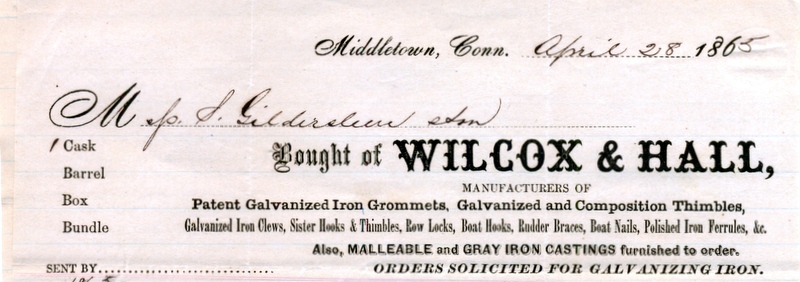
Part of an 1895 Monthly Statement.
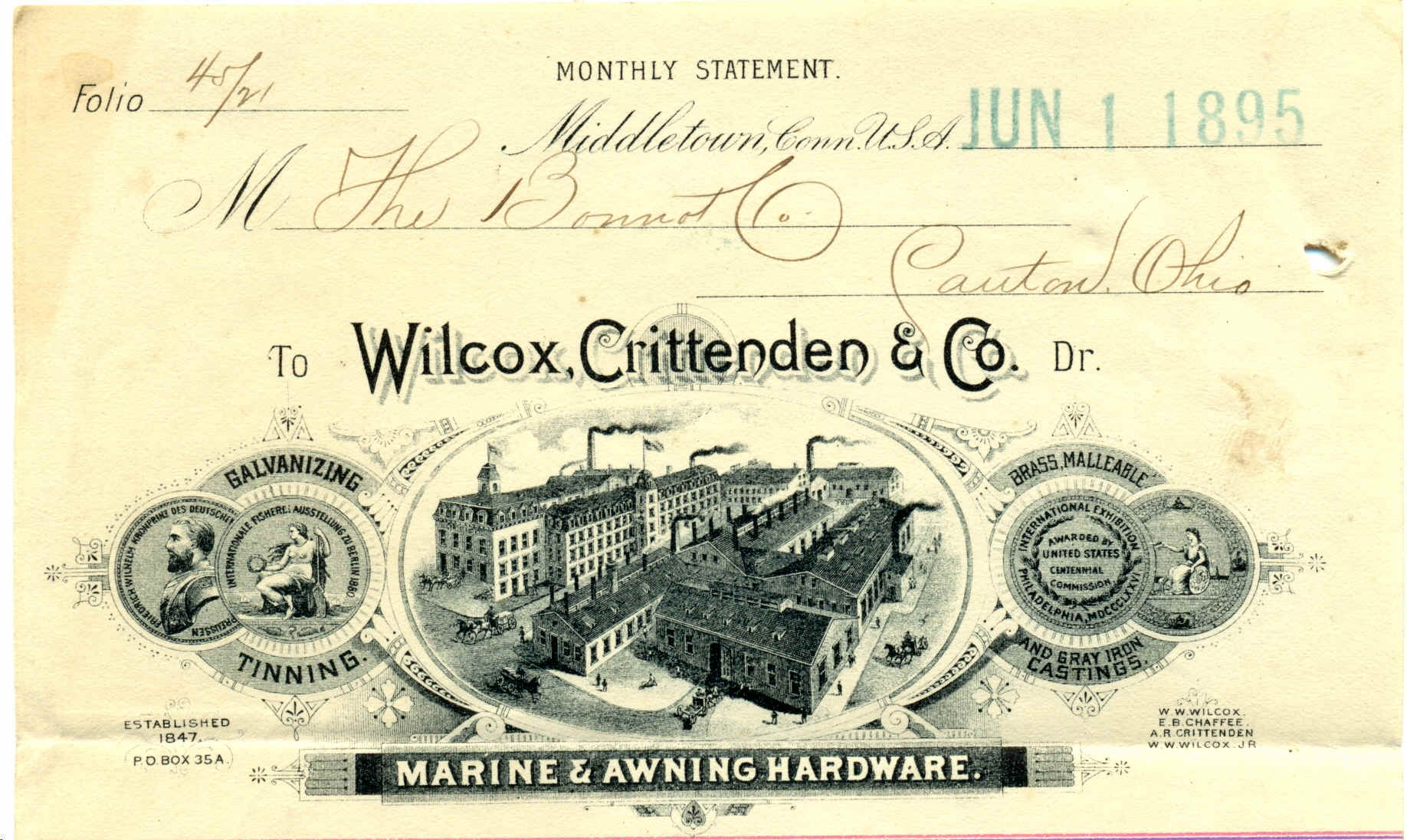
W. W. Wilcox
E. B. Chafee
A. R. Crittenden
W. W. Wilcox JR.
Letter Head C1920

This is the return address in 1903
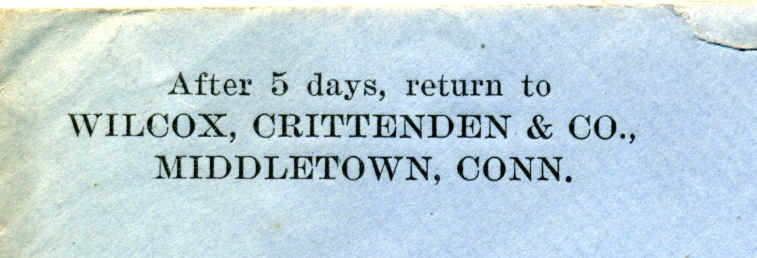
This is the return address in 1913
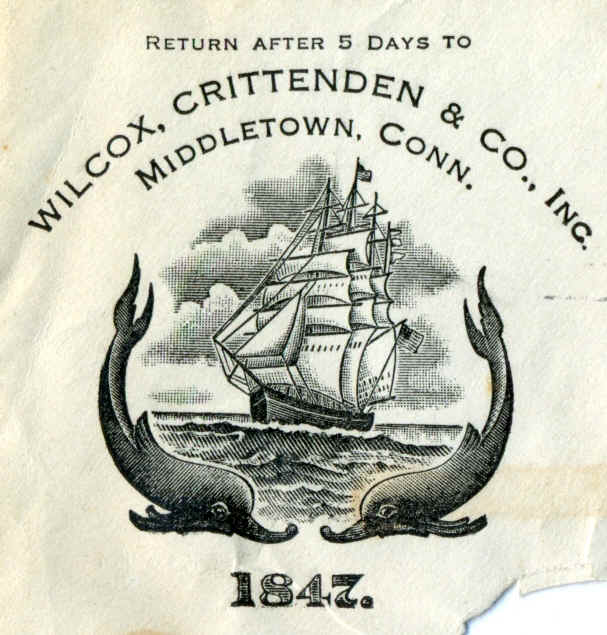
An 1889 letter and circular.

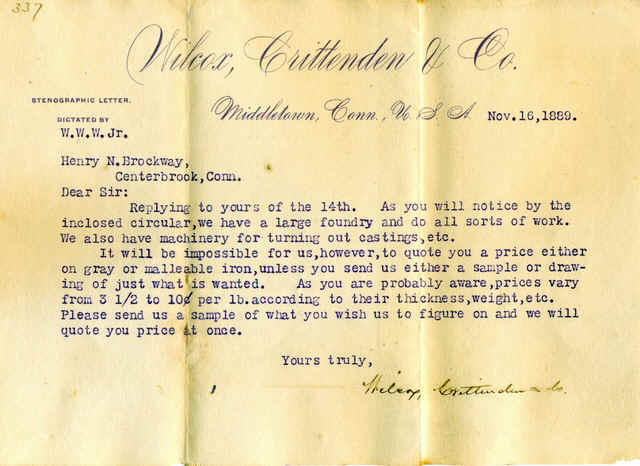
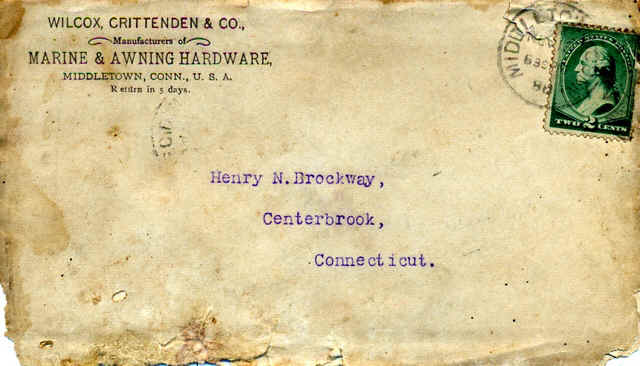
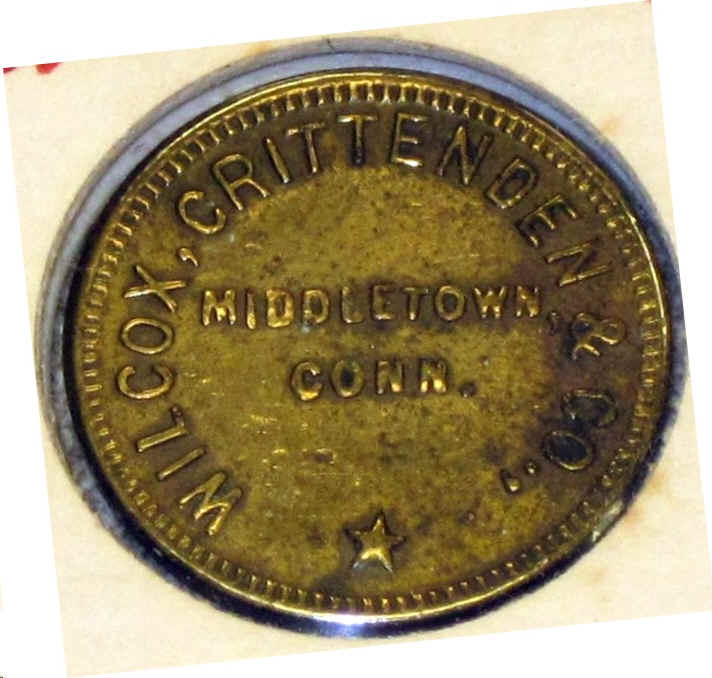

Pictures of a Brass Trade token provided by Dan Hemperly, Hamden, CT.
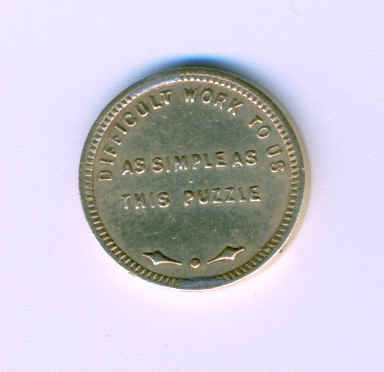
Another token marked "DIFFICULT WORK TO US AS SIMPLE AS THIS PUZZLE".
Below is an early picture of Wilcox's dam.
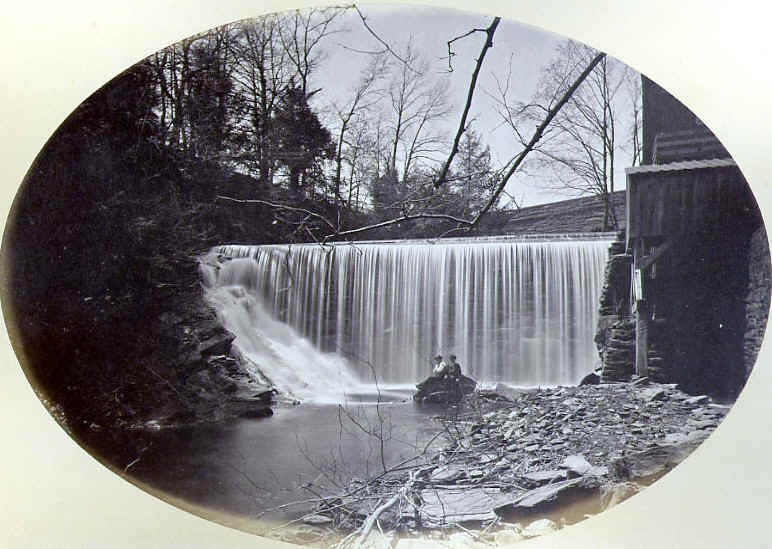
WC buildings on South main Street.
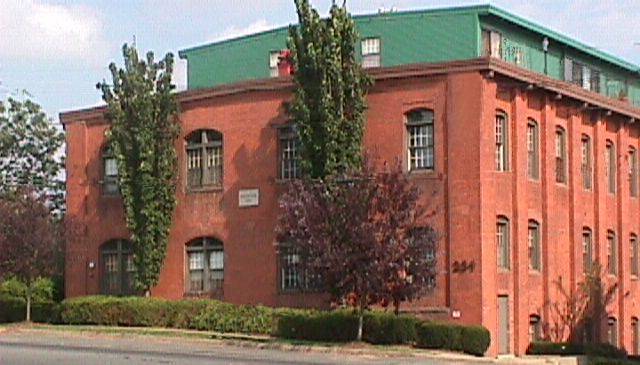
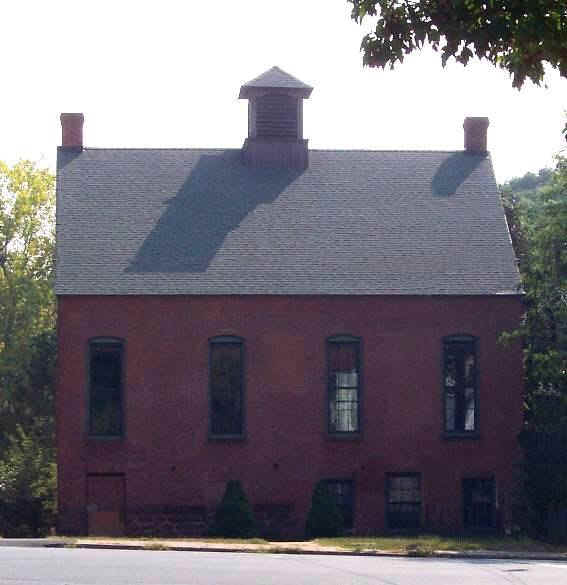
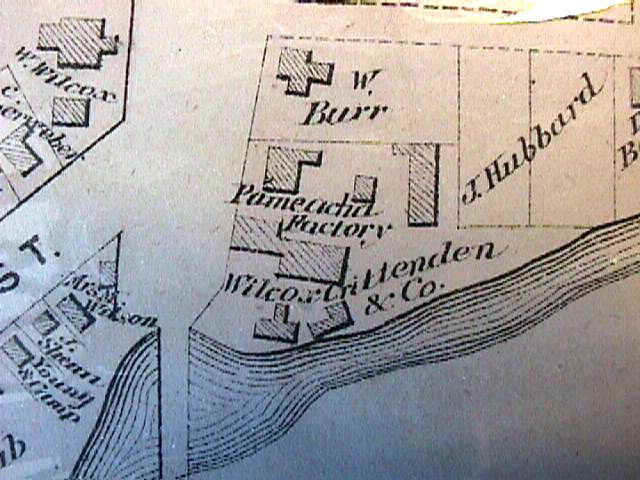
The picture below is from a series of old photographs by the Middletown National Bank.
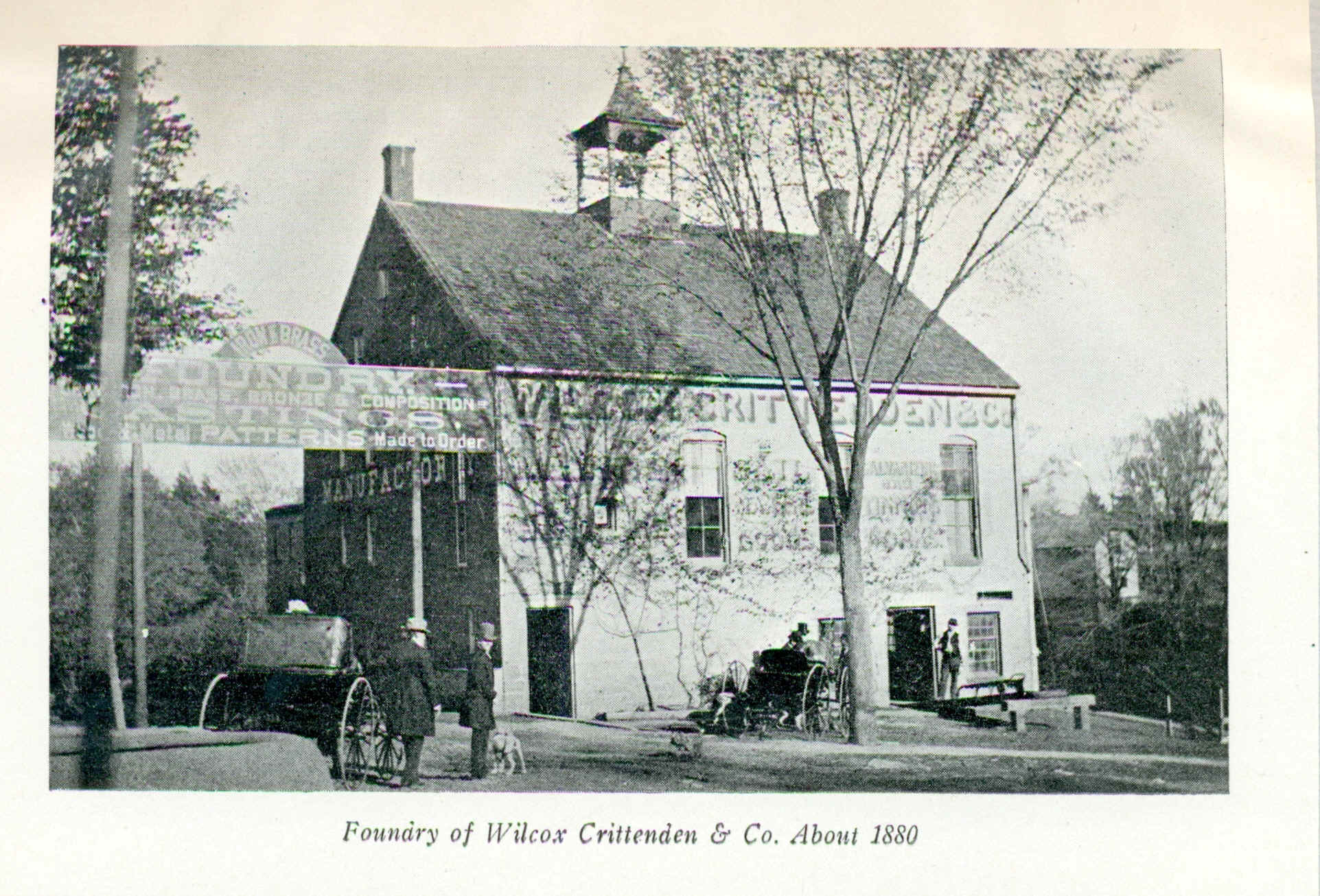
Map location from the Beers 1874 map. Warrick Street is to the left and the company on South Main Street.
This is a Dory ashtray. It came out sometime in the 1930s. It is not in the 1930 catalog but is in 1936.

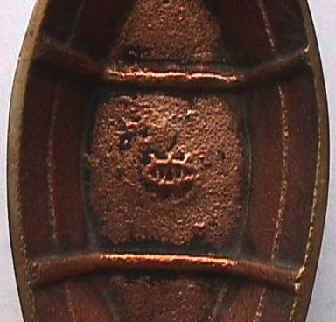
Marked in the bottom is the WC Mark.
Below is a five-year pin. It is sterling silver and approximately 5/8 of an inch in diameter. Badge from Department 4. 1 3/4 inch in diameter.
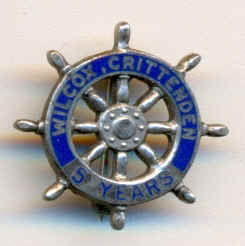
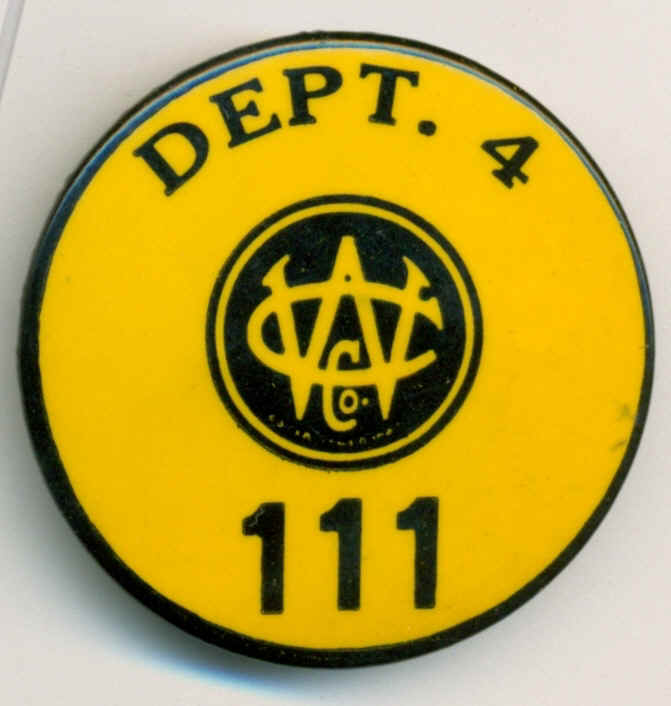
Below are pictures from a C 1925 W/C Catalog.
References: 3, 7 10, 14, 24, 30, 34, 35, Back Home
If you have information to add or comments please email them to me.
© 2025 Richard D. Dickerson. All Rights Reserved.